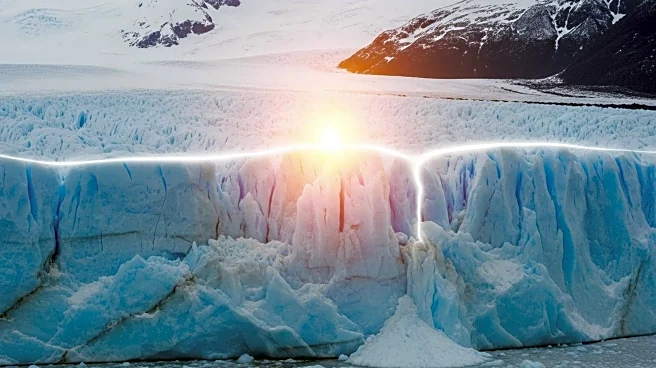What's Happening?
Switzerland's glaciers have experienced a significant reduction in volume, shrinking by 3% this year, marking the fourth-largest annual retreat on record. This decline is attributed to global warming, as reported by Swiss glaciologists. Over the past decade, the ice mass in Switzerland, which hosts the most glaciers in Europe, has decreased by 25%. The Swiss glacier monitoring group GLAMOS and the Swiss Academy of Sciences highlighted that more than 1,000 small glaciers have already disappeared. The rapid melting was exacerbated by a winter with little snow followed by the second-warmest June on record, leading to early depletion of snow reserves and accelerated melting.
Why It's Important?
The retreat of Swiss glaciers has significant implications for various sectors, including hydropower, tourism, farming, and water resources across Europe. The loss of glaciers is altering Switzerland's landscape, causing mountains to shift and ground instability. This environmental change poses risks to infrastructure and communities, as evidenced by a recent incident where a mass of rock and ice from a glacier impacted the village of Blatten. The ongoing glacial retreat underscores the urgent need for addressing climate change and its impacts on natural resources and human settlements.
What's Next?
Swiss authorities are on heightened alert for further landscape changes due to glacier retreat. The continued monitoring of glacier conditions is crucial for predicting and mitigating potential hazards. Efforts to combat climate change and reduce greenhouse gas emissions are essential to slow down the rate of glacial melting. The international community may need to collaborate on strategies to manage the consequences of glacial loss, including water resource management and disaster preparedness.
Beyond the Headlines
The rapid melting of glaciers in Switzerland highlights the broader issue of climate change and its global impact. The loss of glaciers not only affects local environments but also contributes to rising sea levels, which can have far-reaching effects on coastal communities worldwide. The situation in Switzerland serves as a stark reminder of the interconnectedness of global ecosystems and the need for comprehensive climate action.








